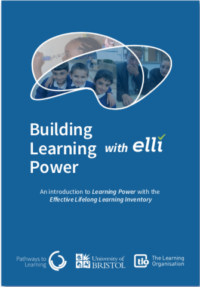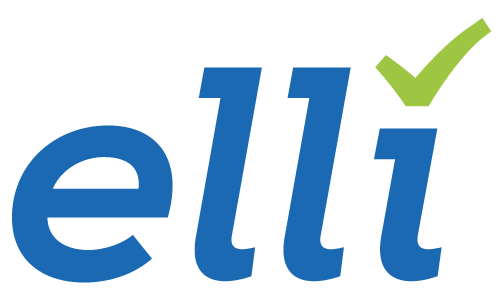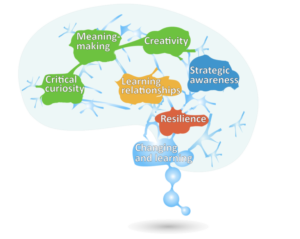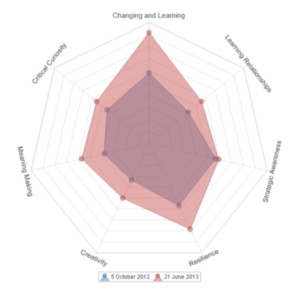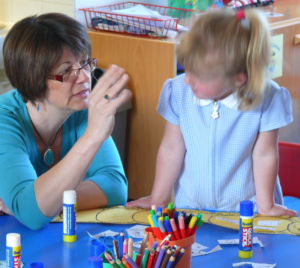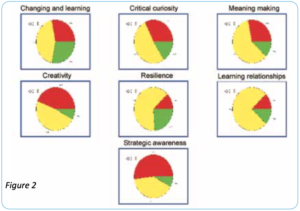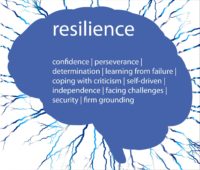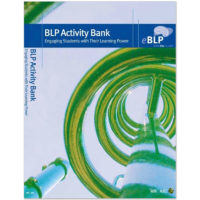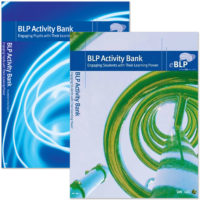How do your students see themselves as learners?
Welcome to ELLI … now available to TLO’s customers
ELLI (the Effective Lifelong Learning Inventory) is an online questionnaire that captures your students’ views of how they see themselves as learners.
It is a persuasive agent of change and a reliable learning diagnostic tool that:
- shows students their unique learning power profile
- informs and inspires change
- prompts students to reflect on how they learn
- develops students’ sense of autonomy with respect to their learning
- helps students to set focused development goals
The diagnostic tool, based on self-reported ratings, supports the self-evaluation of Learning Power. The resulting profiles enable students to understand themselves as learners, and later to claim ownership and responsibility for what and how they learn.
TLO is delighted to be able to offer you ELLI … the instrument that assesses and tracks Learning Power.
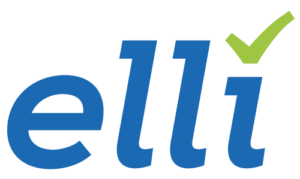
Using ELLI profiles will:
fascinate your students with discoveries about their Learning Power
cause your students to want to build their learning habits
encourage your students to strive to achieve effective learning patterns
guide your students on their learning journey
1. What are the powers of learning?
The idea of Learning Power has been a feature of education for more than 20 years and there are many ways of deconstructing it. Learning Power began its journey in research undertaken at the University of Bristol led by Professor Patricia Broadfoot and Professor Guy Claxton.
This research into learning sought to capture the essence and meaning of Learning Power and identified 7 critical dimensions of Learning Power. These dimensions should be viewed more like attitudes or dispositions than capabilities or skills.
Find out how the original ELLI 7 learning dimensions become the 17 BLP learning powers.
The seven dimensions of Learning Power
The ELLI research sought to capture the essence and meaning of Learning Power and identified 7 critical dimensions of Learning Power. These dimensions can be viewed more like attitudes or dispositions than capabilities or skills.
- Changing and Learning – our disposition to grow as a learner
- Critical Curiosity – our disposition to ask questions to ‘get to the bottom of it’
- Meaning Making – our disposition to make connections between past information / experience and new knowledge
- Creativity – our disposition to think ‘outside the box’
- Learning Relationships – our disposition to learn with and from others
- Strategic Awareness – our disposition to be aware of and in control of our learning
- Resilience – our disposition to be robust when the going gets tough
Let’s take a more detailed look.
1. Changing and Learning
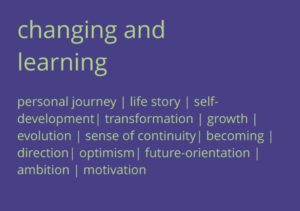
Characterised by a sense of oneself as someone who uses what they learn to change the way they go about their daily life over time; understanding that learning is itself learned. The opposite is being ‘stuck in a rut’, static, with no apparent recognition of new knowledge; tending to believe that Learning Power is fixed and that any difficulties that confront them only serve to reveal their limitations. Changing and Learning is about self-awareness. It is about understanding that we are changing and adapting all of the time, and that everything we do is a lesson learnt. It means that we can make sense of our learning by viewing it in a wider context, as part of our life story, or ‘learning journey’.

2. Critical Curiosity
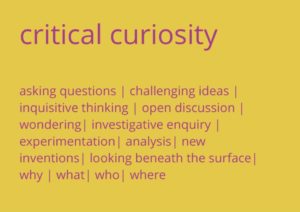
Characterised by wanting to get to the cause or truth of the matter, digging below the surface and being less accepting of received wisdom until it is evidenced; the opposite is being passively accepting, believing received wisdom is ‘the truth’. Critical Curiosity is about asking questions. It is to wonder who, why, what, when, where, if and how. It is the refusal simply to accept information at face value, and the determination to look beneath the surface. It knows that asking questions might ultimately be more valuable than having all the answers.

3. Meaning Making
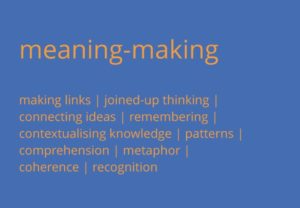
Involves making connections between past information and/or experience and new knowledge; the opposite is merely to accumulate data or information without regard to its application. Meaning Making is about how we make sense of things. It is about connecting one thing to another, and seeing relationships between ideas, information and experience. It allows us to see the narrative in a set of events, rather than processing fragments of information in a disconnected and piecemeal fashion.

4. Creativity
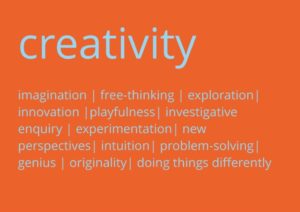
Characterised by risk-taking, playfulness, thinking outside the box, regularly using imagination and intuition; being receptive to hunches and inklings that bubble randomly into their minds; the opposite is being bound by the rules.
Creativity is about the freedom to discover. It is about trying things out for oneself, in one’s own way, rather than learning by rote or repeating the status quo. In creating something new, we are taking a risk; challenging what already exists. We are also bringing something original and authentic from our own experience.

5. Learning Relationships
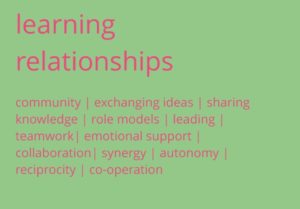
Enjoying learning not only with and from others but also alone, balancing interactive and solitary learning, and maintaining their independent judgement; the opposite is being either ‘isolated’ or ‘over-dependent’. Learning Relationships is about how we work with others. It is about knowing how to balance our interactions for the best possible outcome; at times sharing knowledge and experience, at times asking for help or guidance, and at times being able to work alone, drawing on our own resources.

6. Strategic Awareness
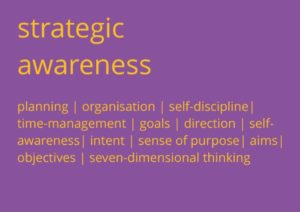
Being aware of one’s thoughts, feelings and actions as a learner and being able to use that awareness to plan and manage the process of learning as well as create personal direction; the opposite is being ‘robotic’ and entrenched. This dimension may sometimes be referred to as metacognition. Strategic Awareness is about intentionality and sense of purpose. It governs the way we set about planning and becoming conscious of our aims and objectives. It is about our conscious use of time and resources – and how we use our learning journey thus far – to project our future.

7. Resilience
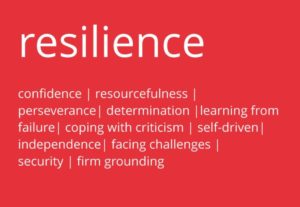 Having an orientation towards perseverance in the development of one’s own Learning Power. Relish challenge, as well as being robust when the going gets tough; the opposite is fragility and dependence. Resilience is about feeling secure and unafraid. When we are afraid we find it hard to make mistakes, since we fear being judged; either by peers, teachers, parents, or by our own internalised self-critic. When we are Resilient we can work through fear and can learn from our mistakes, being self-aware instead of self-conscious.
Having an orientation towards perseverance in the development of one’s own Learning Power. Relish challenge, as well as being robust when the going gets tough; the opposite is fragility and dependence. Resilience is about feeling secure and unafraid. When we are afraid we find it hard to make mistakes, since we fear being judged; either by peers, teachers, parents, or by our own internalised self-critic. When we are Resilient we can work through fear and can learn from our mistakes, being self-aware instead of self-conscious.

From Learning Power to Building Learning Power
Learning Power’s premise is that learning can be learned; it is a learnable craft. However, the seven dimensions that emerged from the original research and pillars of ELLI’s assessment practice, were re-grouped and translated into the language of schools by Professor Guy Claxton.
Firstly, the seven dimensions were unpicked to reveal 17 Learning Power behaviours, sometimes known as ‘learning muscles’. These named behaviours —such as Listening, Reasoning, or Planning — were derived from the many aspects of principal characteristics of the seven dimensions. These behaviours are specific in nature and so they can be individually cultivated, and exercised in classrooms.
Secondly, the rich list of behaviours was divided into four aspects of learning theory (cognitive, emotional, social, meta-learning) This link to learning theory helped teachers get to grips with the ideas although the R words (Resilience. Resourcefulness, Reciprocity, Reflectiveness) often muddled the issue. This unpicking and re-arranging of the original ideas served to broaden and strengthen the language of learning, with particular reference to school settings. Using and extending the language has added breadth and depth to how teachers and learners talk about, understand, and improve learning.
The picked out Learning Power framework is known as the Supple Learning Mind
- The Emotional domain of learning (previously described as Resilience) absorption, managing distraction, noticing, perseverance.
- The Cognitive domain of learning (previously described as Resourcefulness) questioning, making links, imagining, reasoning, capitalising.
- The Social domain of learning (previously described as Reciprocity) interdependence, collaboration, listening and empathy, imitation.
- The Strategic domain of learning (previously described as Reflectiveness) planning, revising, distilling, meta-learning.
This Supple Learning Mind framework makes it obvious that learning isn’t just about having a good memory; it includes how we feel, how we think, how we learn with others and how we manage the process of learning; showing learning is a complex process. Furthermore it provides a language that helps teachers to think about how they might cultivate each of the learning behaviours and helps students to gain a personalised understanding of how they learn content.
How the 7 dimensions of Learning Power become the 17 learning behaviours of Building Learning Power

2. How does ELLI help students?
ELLI provides fascinating feedback that helps students, and their teachers, to consider their learning against the seven dimensions of learning power. The spidergraphic (see right) suggests someone who reports herself to be somewhat resilient, disposed to keeping going and trying, as well as to some extent being able to be aware of what she is trying to do or learn.
A spidergraphic
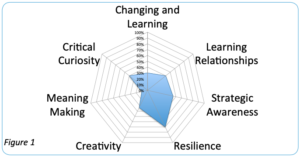
Interpreting the profile
The profile shows the student is significantly lacking in a sense of herself as able to change and grow over time, and is passive in terms of the dimensions of meaning-making, creativity and curiosity. She has more of a sense of ‘teamwork’ and positive learning relationships.
As well as the spidergraphic, students receive written feedback about each of the dimensions. This helps them to better understand and talk about the spidergraphic and what it seems to show.
Students are encouraged to ask:
- What is my profile telling me?
- Which dimensions are strengths?
- What is surprising me?
- What am I pleased about?
- How would I like my profile to be different?
- Which dimension do I want to work on?
- How could I think and act differently to strengthen that learning dimension?
- How will I respond if my plan doesn’t go exactly as I expect?
Kick start students' personalised learning journey
Kick start a learning journey that can be designed to meet students’ requirements.
Learning matters to everyone and being an effective learner offers great advantage in a world of constant change. So helping students to invest in their own learning power will pay lifelong dividends. Increasing their own learning power is a process that continues through life and the ELLI profile uncovers the dimensions of learning power and starts to stimulate a better charted journey of improvement. ELLI has played a significant part in helping students to:
- engage in reflection and become more self-aware
- communicate meaningfully about their learning
- develop self-reliance, becoming less dependent on teachers and other adults
- decide on change strategies
- recognise, monitor and report on change
manage their transitions between key stages
Check learning patterns and progress
Develop behaviours to build a love of learning, nurture creativity, strengthen resilience and counter underachievement.
ELLI helps students to manage their own learning by understanding more about their strengths. This helps them to maximise their learning opportunities and learn more efficiently. ELLI helps learners establish how to navigate learning opportunities, practise learning methods and choose from a variety of challenges and learning strategies – in order to develop a more rounded Learning Power profile. The online learning power profile can be taken again (2 in a year) to establish changes and guide the learning journey forward. It is often when students see that their profile has changed that they really appreciate that they have the power to change and that learning is their responsibility.
3. How does ELLI help teachers?
Elli forms the basis of personalising tutoring support. The learning profiles provide the basis for focused learning conversations leading to learning goals and plans. Elli also helps to focus teaching strategies in ways that promote student ownership and engagement, and in developing a language for learning which can be shared and used in the classroom.
Elli can also contribute to enhancing career advice. Beyond the idea of subject relevance, undertaking ELLI enables students, teachers and career advisers, to explore learning habits associated with particular jobs or careers.
Personalise tutoring advice
A Learning Power profile can provide the basis for developing high quality coaching relationships between individual learners and their teachers or mentors. Learning profiles provide the basis for focused learning conversations. For students these may be about their learning at school and at home.
Learning Power conversations
Termly or twice yearly conversations about the learning profiles can be a cornerstone of developing and assessing Learning Power. After taking the ELLI questionnaire, students enter into a coaching conversation with a teacher/coach. During this conversation they are encouraged to think about how they might make their use of a dimension stronger, broader and deeper.
Where the student is showing hardly any use of a learning dimension the teacher’s coaching prompts encourage a discussion on:
- exploring the meaning of the learning dimension
- thinking about why the dimension is/will be useful to them
- gauging what would help them to use it more often
Where students are showing some use of a dimension the coaching prompts focus the discussion on:
- deepening understanding of that learning dimension
- trying to remember to use it in different domains
- exploring the benefits they might gain from using it
- seeking out what could trigger them to use it more broadly
This is a critical stage. Exploring what triggers the use of a learning dimension begins to nudge casual or reflex use into deliberately strengthening and broadening the habit of using it.
Where students are already showing strong use of the dimension, the coaching-prompts might encourage:
- seeking examples that validate the ELLI profile’s judgement of strong use
- talking in more depth about the dimension in action
- exploring how they can become even more skilled in using it
- probing what triggers its use
- discovering where else it might be useful.
Such conversations tend to deepen teacher-student relationships, help develop the common language for learning, and invigorate students’ interest in their Learning Power.
Use the data to focus teaching strategies
Class profiles
The scores of a whole class or group can be downloaded as CSV files. Opening the CSV files in Excel will enable you to produce the data as pie charts The pie charts below indicate the relative numbers of students who report themselves to have high levels of a dimension (green), low levels (red) and moderate levels (yellow).
This class profile suggests a class with relatively low levels of strategic awareness and the active learning dimensions of Creativity, Curiosity, and Meaning Making. However, they are more likely to exhibit positive Learning Relationships, a sense of Changing and Learning, and Resilience. In fact, this sort of profile is typical of a class being prepared for external, summative assessments—they are willing to receive and remember what they need to know to pass the test, to work hard, but they generally lack the active learning strategies necessary to figure it out for themselves and, importantly, the awareness of their own learning practices.
This information has proved important pedagogically in focusing teaching strategies in ways which promote ownership and engagement, and in developing a language for learning which can be shared and deployed in the classroom.
Enhance career advice
The new Gatsby Good Career Guidance advises that all teachers should link curriculum learning to careers. For example, STEM subject teachers should highlight the relevance of STEM subjects for a wide range of future career paths.
Beyond the idea of subject relevance, undertaking ELLI enables students, teachers and career advisers, to explore learning habits associated with particular jobs or careers. What does it take to become a xxxx? Which learning behaviours need to be very strong in this sort of role? How students use their learning behaviours has, and will continue to have, a major impact on their future jobs and careers. Their propensity for change, their critical curiosity, how they work with others, etc. are as important, if not more so, than their differentiated grasp of certain subject areas. Their ELLI profile, when leaving school, is likely to influence their performance in whatever role they go on to pursue.
4. How does ELLI enable the school?
Use of Elli encourages a school to design a curriculum to give students opportunities to stretch and develop all their learning dimensions. This has suggested five future-based principles that schools can use to guide their curriculum reform as they develop curricula for the twenty-first century.
ELLI makes it possible to capture hard-to-reach data in its profiles, namely, how well are students learning and what might be causing the problem? Hence schools have immediate evidence of students’ growth in self-regulation, independence, confidence and resilience.
On the staffing side inviting potential candidates to undertake the ELLI profile can greatly enhance and future proof the selection process, finding employability dispositions to ensure staff thrive and contribute to the school’s learning culture. Elli also supports induction and performance management.
Design appropriate curriculum
Design a curriculum to give students opportunities to stretch and develop all their learning dimensions.
The key to improving students’ Learning Power is the ability of schools to adapt their curriculum as a whole, as well as encouraging habit change in individual teachers. Use of ELLI has suggested five future-based principles that schools use to guide their curriculum reform as they develop curricula for the twenty-first century.
Curriculum change principles
Principle One: Preparation for a lifetime of learning. The school agrees that the ELLI capabilities are what learners need to acquire: that will serve them well in uncertain futures throughout their lives.
Principle Two: Fusion of learning habits and curriculum knowledge. The school considers how best to integrate acquiring knowledge and ELLI learning skills across the curriculum.
Principle Three: Extension of learning beyond the constraints of school time and place. The school considers how to design experiences beyond the short classroom lesson to create extended learning and reach into the informal learning lives of young people outside school.
Principle Four: Making learning more authentic. The school considers how to make sure that the learning experience in school matches more closely with learning in the real world.
Principle Five: Learner participation in curriculum design and delivery. The school considers how to design the curriculum so that students become leaders of their own learning. Which elements of curriculum will students have a role in designing and delivering?
The Learning Powered School: Pioneering 21st Century Education
Evidence learning characteristics
Find and use evidence of students’ growth in self-regulation, independence, confidence and resilience.
ELLI helps schools to explore and show how students’ understanding and use of learning behaviours is changing and growing. The online learning power profile can be taken again (2 in a year) to establish changes and guide the learning journey forward. Beware though, students taking the questionnaire for a second time can give answers that reflect their behaviour more cautiously; this can result in the profiles looking more limited.
On the positive side, it’s often when students see their profile has changed (fatter or more spiky, etc.) that they really appreciate that they have the power to change and that learning is their responsibility.
ELLI makes it possible to capture hard-to-reach data in its profiles, namely, how well are students learning and what might be causing the problem? Class profiles will show how classes have moved over the year. Maybe a 30% increase in students who are showing strongly on resilience. or a 50% increase in students who are now better at self-regulating (Strategic Awareness). Similarly you could discover which years, which subjects, which groups have made the greatest strides in growing their learning behaviours.
Schools in England may want to look at how well their students are developing their resilience, confidence (shown through a more rounded profile) and independence (shown through Strategic Awareness). ELLI offers valid Pupil Voice evidence of development in these learning habits. These are three key behaviours mentioned in the 2019 Ofsted Framework.
Welsh schools will want to look for the general development patterns of all the learning dimensions and link these to the Four Purposes of their Successful Futures curriculum. Such data will help to show whether their curriculum and teaching approaches are on the right lines; that students are living the curriculum’s Four Purposes throughout their time in school.
Whatever the school’s curriculum drivers, this critical range of ELLI learning behaviours offers important and unique data that reflects how, and how well, their learners are learning how to learn in preparation for their futures.
Select staff to thrive
New staff appointments
Find applicants’ employability dispositions. Ensure staff thrive and contribute to the school’s learning culture. Support induction and performance management.
Inviting potential candidates to undertake the ELLI profile can greatly enhance and future proof the selection process. The Learning Profile is used to identify candidates’ attitudes to learning and, subsequently, to focus discussion around how their attitudes to learning and propensity for change influences their classroom practice. This helps the school to discover if and how a candidate’s own learning behaviours would support, rather than hinder, the school’s vision for learning.
Teacher induction
The Learning Power profile can be used to identify attitudes and approaches to learning and using these to agree a personalised induction plan and/or at various transition points in their career plan.
Motivated and capable staff keen for accelerated career progression are better equipped to take advantage of learning opportunities they are offered if they are using ELLI to help them develop.
Supporting experienced staff to keep up. Elli profiles can be useful in supporting staff who need to accelerate their learning as job roles, responsibilities and technology changes require them to adopt new skills and behaviours.
Performance management
ELLI supports leaders and line managers in developing and monitoring the performance of their staff. Used within an established and trusted relationship it can help to:
- identify trusted learning methods/approaches and match these to opportunities for development e.g. a member of staff with highly developed critical curiosity may be motivated by the opportunity to work on part of the school development plan that requires a lot of investigative and research skills, whilst a highly creative learner may enjoy being involved in a new initiative or curriculum development.
The Learning Powered school treats staff as learners, growing their Learning Power and developing their teaching (work) habits. They are supported to work in and as a community of enquiry, researching the effects of changing practice, coaching each other to develop ideas, and keeping practice under review in order to build future development. In this environment, staff motivation comes from releasing and sustaining their own Learning Power. The implementation of Learning Power’s methodology drives not only the school development plan, but also its career management, releasing every member of staff to become an agent of change.
ELLI a trusted learning profile
Built from serious academic research
ELLI emerged from research into lifelong learning at Bristol University. This identified seven dimensions of Learning Power that create a step change in individual, team and organisational performance. The dimensions are responsive to the circumstances of the immediate environment (the classroom) and are sensitive to relationships and social challenge.
ELLI is used beyond schools
ELLI has been used effectively beyond education in the Civil Service, across the commercial landscape of SMEs and in Further and Higher Education. It has revolutionised the performance of reluctant learners in companies and thereby the company itself.
ELLI is part of the natural history curriculum run jointly by Penn State University and the Smithsonian in Washington. There is on-going academic research into ELLI and its constituent habits and behaviours in a number of universities internationally in the University of Porto, Portugal, Istanbul in Turkey, Vienna in Austria and among undergraduates at Deakin University, Melbourne, and Southern Cross University, Northern Rivers, Australia.
Find out more
How ELLI fits with developing students’ learning power?
Find out more about how Building Learning Power and ELLI work together to build better learners in our new book Building Learning Power with Elli